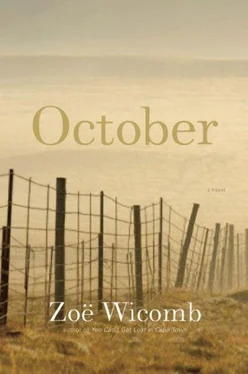There were also Sunday afternoons when the children played together between rows of rustling mealies. Then they would strip barely bearded cobs and chew at the sweet milky seeds. They’ll know, Jake said earnestly; they know everything we do or think, and that’s why we’ll be beaten. They know the bad things we don’t know that we’ve done or thought, the things we will do tomorrow and the next day. Jake said he hated Grootbaas, that he wanted to be bad bad bad beyond the old man’s imagination.
Look, he said, I’m a mealie, as he stripped off all his clothes and rolled in the dust. The only reason they won’t admit that they know I’ve been bad is because they’re ashamed. That’s grown-ups for you, frightened of nakedness. But what the old boy will do all the same is beat the shit out of us. He’ll find a reason.
And he did. Waited for them on the stoep with the aapstert swinging from his left hand. From his right hand he sipped noisily from his afternoon cup of coffee. There was no escape from those Argus eyes, from his omniscience. A father who loves his children knows everything, he claimed, like God. Knows when they’ve been bad. He did not want them to turn out like the people of Kliprand, like the dirty, drunk Bassons. Jake rolled his eyes at Mercia. He would rather not be loved. Besides, he admired the Bassons, who spent their waking hours around a fire in their kookskerm without a roof, happily without chores. At weekends their tin guitars tinkled across the veld, and the dust rose as they danced the kabarra.
For Jake, that is all their childhood has been: the fear of Father and God. In that order. Why was it impossible for him to summon the cool of summer evenings when they finished the chores, the sheep and chickens put to rest under flaming skies, and the sudden dip of the sun that would plunge all into darkness? Then they sat outdoors and listened to the swallows swooping in and out of the eaves. In December they sang carols, their mother teaching them to harmonize, and they laughed at the old man’s off-key voice. Hark the herald angels si-ing. The beauty of the word, hark, that made you sit bolt upright and feel the quiver of bats as they dived. Then Father, scrambling for his rightful place, would say, Look at the stars. Come and find the Southern Cross, the Three Kings, the Bear.
When the sun’s lingering on Capricorn brought the fiercest heat, Mercia and Jake would sleep under the stars on the old wooden trailer, and watch the Three Kings beaming and bending over the newborn Christ child. Jake was her darling baby brother whose antics made her laugh, for whom she feared, and as the fresh morning air arrived the children snuggled close together under the yawning stars.
Mercia drifts from the southern December to the lingering light of the Scottish summer. After all these years the slow inching of day to darkness still brings melancholia; for all its reliability still creeps upon her as a surprising ache of weltschmerz, until darkness finally engulfs the day. Now sitting in Sylvie’s yard, she thinks of that dusk-bound sadness as a longing for the African night, for blackness that like a screen is swiftly, securely drawn across the sky, obliterating the day in a quick, decisive death — obliterating guilt.
Oh, she hears again Craig’s lilting brogue, his steady hand mixing her a drink. Your sundowner, Madam, he would jest. Wrong hemisphere, she’d groan. Sundowners were for Europeans trying to adjust to the swift descent of the African night. Over forgetful drink, they flocked together to counter angst and fear, for otherwise the world would yawn with the descent of darkness, showing its inner space, and who could stand that? Certainly not those who had left home in search of a better life in the colonies.
And you? Craig asked, the people of Kliprand, too indigenous to be afraid of the dark?
Precisely, she laughed peevishly. Not a problem in your own, your home hemisphere.
Mercia wonders if that perhaps is what children are for, to ease the shift from day to night through bustling, tiring chores. No, of course not; she knows that dispensing care is not the business of a child.
And now, where is Craig? As she catches a star skidding across the familiar southern sky it feels as if her barely mended heart will break once more.
Oh, this can do no good, this harking back, broken — a far cry from the summery hark of angels.

Jake the monster is bellowing from his room, throws what sounds like a shoe against the door, barely audible above the voices of the soap opera that Sylvie is watching. Transfixed by the television, she doesn’t hear him. Mercia rises. It is preposterous, Jake behaving like a child, refusing to get out of bed. She barges into his room and gropes for the light switch. A bare bulb casts dim, eerie light onto a figure she cannot bear to look at. He is lying on his back, his hands on the bedcover are shaking; his eyes are screwed shut against the dangling lightbulb, his face yellow-brown and bathed in sweat.
It’s evening, time to get up, she says briskly. I’ve come all this way and you haven’t as much as looked at me.
Jake opens his eyes and looks at her, squinting. Get me a drink, he growls. He tries to lean down to retrieve a wine box from the floor but doesn’t manage. It’s empty, he says, that bitch hasn’t brought my drink.
Forgotten your manners, have you, dear ogre? That’s no way to speak of your wife, Mercia says. Stop this ludicrous behavior right now. You’re an adult, so get out of bed and see to your own needs. And while you’re about it, pay some attention to your child. He didn’t ask to be here.
Jake clutches his aching head. My child? Well, neither do I want him here. It’s all down to that bitch and her scheming. Please man, Mercy, he pleads, get me a drink, anything. He tries to get out of bed but falls back with exhaustion. Perspiration beads on his upper lip, and his thin arms tremble.
I’ll get Sylvie for you, Mercia relents, but only if you promise to speak politely. And to see a doctor tomorrow. You’re sick, you need help, Jake; you’ve got to stop drinking.
Yes, yes, yes, he says. I promise. You’re right. I’ll do whatever you say, just get me a drink now.
Sylvie is irritated. He can wait, she says, now speaking quietly, her eyes fixed on the television screen. He’s a liar. You mustn’t believe a thing he says. Promises! She laughs bitterly, then stops to concentrate on a woman on the screen who speaks indistinctly through dramatic sobs.
Ag no shame, Sylvie tuts, it isn’t that poor Thandi’s fault, then she returns to the real-life drama at home: I’ve heard plenty of Jake’s lies. The only promise I believe in is that he wants to kill us, me and Nicky. It’s just that he doesn’t have the strength, but he’ll think of some way to do it. Just you wait and see when—
She stops in midsentence as the camera returns to the sobbing woman, but when the advertising jingle starts up, she says, He killed your father, you know.
•••
Jake did not aspire to doing well at school, but without much effort he excelled in mathematics and science. Which he resented for the pleasure it brought their father. See, he said bitterly, how it encourages the old man to make up more and more rules: in bed by nine, up at five; nothing other than mealie porridge for breakfast, which made Jake gag; no sweets; no pocket money; no radio during the week; only study, study, study. No this, no that, a mouthful of homilies, and stupid idioms: spare the rod and spoil the child; a bird in the hand is worth two in the bush; make hay while the sun shines; honor thy mother and thy father that thy days may be lengthened in the land of the Lord; and the usual nonsense about gratitude. Oh, it made him sick. If Gentle Jesus were meek and mild how could it be good for a child to be bullied and beaten? How could the Hit Parade or pictures of John Travolta or Grace Jones that he had put up on the wall be bad?
Читать дальше













